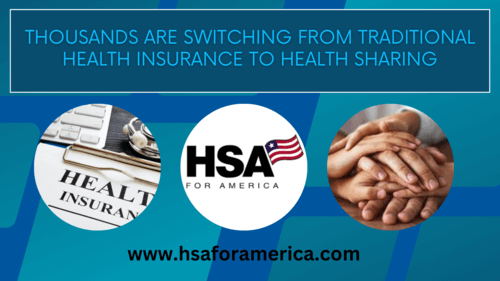
Health Insurance and Health Sharing
The promises of the Affordable Care Act have long since fizzled. Instead, Americans are faced with soaring health insurance premiums, sky-high deductibles, and complex insurance policies.
As a result, increasing numbers of Americans have turned to a more efficient, lower-cost alternative to traditional health insurance approaches: health sharing.
According to the Alliance of Health Care Sharing Ministries, at least 1.7 million people nationwide are already members of health sharing ministry organizations as of mid-2023.
And since the Alliance represents just a few of the dozens of active health sharing ministry organizations, that figure is almost certainly underreported.
So, what’s driving this mass transition away from traditional health insurance to health sharing?
A number of factors, including:
- Non-profit structure
- Cost advantages
- No narrow provider networks
- More freedom to choose doctors
- More transparency in pricing
- Moral and ethical considerations
- A sense of community
This blog post will explore each of these factors in turn. We’ll conclude with links to several resources where you can learn more about health sharing, and even sign up for a plan yourself in just minutes.
Lastly, there’s a list of Frequently Asked Questions about health sharing at the end of this page.
Non-Profit Structure
Generally, traditional health insurance companies are for-profit companies.
That means they’re run for the benefit of stockholders. Not members.
Health sharing organizations, on the other hand, are 501(c)3 non-profit entities. They’re run for the benefit of members, not Wall Street.
Members contribute a predefined amount, each month, called a “share,” which is pooled and used to cover medical expenses for members who need it.
Health Insurance and Health Sharing Costs
Traditional health insurance plans have become prohibitively expensive – especially for people who don’t get an Obamacare premium subsidy.
According to the Kaiser Family Foundation, the average unsubsidized cost of an Affordable Care Act-qualified “silver” tier marketplace plan available over the exchanges now tops $1200 per month, or $24,000 per year.
And you still have to pay up to 30% of your medical bills out of pocket (up to your out-of-pocket maximum) of $9,800, as of 2023.
Health sharing plans, in contrast, cost roughly 40 to 50% less on a monthly basis compared to unsubsidized Obamacare insurance costs.
And in most cases, health share plans don’t require you to pay that extra 30% in coinsurance costs.
Normally, with health sharing plans, you just have to cover your initial unshareable amount (sometimes called a member responsibility amount), which functions similarly to a health insurance deductible.
You cover your initial unshareable amount, and then your plan’s cost sharing features kick in.
After that, most healthsharing plans will pick up 100% of eligible costs for most medical events. However, a few health sharing plans have annual or lifetime caps on sharing, which help keep monthly costs low, but increase members’ risk.
Compare Pricing on the Best Insurance Plans Available
Escaping Narrow Networks
Traditional insurance plans often come with “narrow networks,” limiting your access to a specific group of providers and hospitals.
This can be particularly problematic if you require specialized care that is not available within the network. Healthsharing liberates you from these confines, offering you a broader range of options.
Freedom to Choose Your Own Doctor
One of the hallmarks of health sharing is its commitment to healthcare freedom.
Unlike restrictive HMO and PPO networks that limit your choices, most healthsharing plans allow you to choose any doctor or specialist you prefer.
This autonomy means you’re not confined to the lowest bidders in a network, enabling you to seek the highest quality of care.
Price Transparency
Price transparency is a significant benefit in health sharing models.
Because healthshare plan members are technically “cash payers,” they routinely get discounted pricing from healthcare providers.
Under recent medical price transparency laws, hospitals and other providers must clearly disclose their pricing for all medical procedures they offer – including discounted pricing for cash payers.
Additionally, most health share plans have a full-time department of expert health care concierge staffers. Their job is to help you research providers to help you identify the ones that offer the best possible value.
They also help you negotiate the best possible pricing for scheduled/elective medical services – provided you use them.
Many health sharing organizations also negotiate directly with providers to secure lower prices for services, thereby reducing out-of-pocket expenses for their members.
This service is especially valuable if you are in generally good health, and typically don’t expect to reach your initial unshareable amount: Any discounts you can secure by being a member of a healthshare plan benefit you directly, by lowering your out-of-pocket costs.
Ethical Considerations
Many people are attracted to health sharing because it aligns with their ethical or religious beliefs.
While many health sharing ministries are non-denominational, or even secular, many others operate on faith-based principles.
As such, many plans do not share costs related to services and procedures members may find objectionable or abhorrent – something traditional health insurance rarely accommodates.
For example, many health sharing plans don’t share costs related to abortion, in vitro fertilization.
Some plans require members to be married to be eligible for maternity or childbirth cost sharing.
Healthshare plans also typically require members to live health conscious and drug-free lifestyles. They therefore often limit or exclude sharing of costs related to drunk driving accidents and drug and alcohol addictions treatment.
For those who don’t abuse drugs or drink to excess, this is a feature, not a bug, because it helps keep costs down for all members.
Health Sharing is NOT Health Insurance
Though they serve similar functions, health sharing is not the same as health insurance.
In a health insurance model, a contract obliges the insurer to pay for certain costs associated with your healthcare.
Health sharing, however, is more of a community-based approach where members voluntarily share each other’s medical expenses. There’s no guarantee of payment. But healthshare plans have a long history of shared responsibility and community support.
According to the Alliance of Health Care Sharing Ministries, 108 healthsharing ministries successfully share more than $1.3 billion in medical costs for members each year.
Handling Pre-existing Conditions and Surgeries
Traditional health insurance plans usually cover pre-existing conditions, thanks to regulations like the Affordable Care Act.
Health sharing plans, however, are not bound by these regulations.
While some healthsharing organizations do accommodate pre-existing conditions to an extent, there are often waiting periods and limitations.
Health sharing plans also typically impose a waiting period on non-emergency surgeries, as well – 90 days is typical.
Similarly, some elective surgeries might not be shared within the community, unlike insurance plans that might cover them after a deductible is met.
Health Insurance and Health Sharing Conclusion
Whether it’s the significant cost-saving potential, the freedom to choose your healthcare providers, or ethical alignment, health sharing is making its mark as a legitimate alternative to conventional health insurance.
If you’re tired of high premiums, limited choices, and opaque billing, consider making the switch.
To learn more about healthshare plans, to get a quote from some of America’s top-selling health share or health insurance plans, and to enroll in just minutes, year round, click here.
To get more personalized advice tailored to your healthcare needs, contact a Personal Benefits Advisor today.
Here are some additional articles on healthsharing programs: Why You Should Use Independent Doctors? | Medical Cost-Sharing: A Viable and Attractive Alternative to Traditional Health Insurance | How Health Insurance Subsidies Work | Why Health Insurance Costs Are Going Up So Much (And What You Can Do About It)
Here are some additional pages related to this article: HSA Secure Plan | Healthshare Plans
Compare Pricing on the Best HealthShare Plans Available
Frequently Asked Questions About Health Insurance and Health Sharing
What is Healthsharing?
Healthsharing is a community-based approach to healthcare where members voluntarily share each other’s medical expenses. Unlike traditional health insurance, there is no contractual obligation for payments, but there is a history of shared responsibility and community support.
How Does Healthsharing Work?
Members of a healthsharing plan contribute a predetermined amount called a “share” to a communal fund. When a member incurs a medical expense, the community’s pooled funds are used to help cover the cost. The specific mechanics can vary between different healthsharing organizations.
What is the Cost Advantage of Healthsharing Over Traditional Insurance?
Healthsharing plans can be up to 50% less expensive than unsubsidized marketplace health insurance plans. The cost-saving is a significant factor that attracts people to switch from traditional insurance to healthsharing.
Can I Choose My Own Doctor in a Healthsharing Plan?
Yes, most healthsharing plans allow you to choose any doctor or healthcare provider you prefer, unlike traditional insurance plans that may restrict you to a network.
What are Narrow Networks and How Does Healthsharing Compare?
Narrow networks are a feature of many traditional health insurance plans that restrict you to seeing only certain providers. Healthsharing does not usually have this restriction, offering you a broader range of options for healthcare providers.
Is Price Transparency Better in Healthsharing?
Yes, price transparency is generally superior in healthsharing models. Many healthsharing organizations negotiate directly with providers and disclose the cost details to their members, ensuring you know what you’re paying for.
How Does Healthsharing Align with Ethical or Religious Beliefs?
Many healthsharing organizations operate on ethical or faith-based principles, allowing you to opt out of contributing to services you find morally objectionable.
How are Pre-existing Conditions Handled in Healthsharing?
Healthsharing organizations may have waiting periods and limitations on sharing costs for pre-existing conditions, unlike traditional health insurance, which is often mandated to cover them.
Are Elective Surgeries Covered in Healthsharing?
Coverage for elective surgeries varies among healthsharing organizations. It’s crucial to read the terms carefully to understand what types of medical expenses will be shared by the community.
Why are People Switching to Healthsharing from Traditional Health Insurance?
People are making the switch due to the potential for significant cost savings, freedom to choose healthcare providers, and alignment with ethical beliefs.
Is Healthsharing a Form of Insurance?
No, healthsharing is not a form of health insurance. It’s a voluntary sharing model and does not guarantee payment for medical services.
How is Healthsharing Regulated?
Healthsharing is not regulated in the same way as health insurance, as it is not an insurance product. However, many healthsharing organizations have self-imposed standards and accountability measures.
What Types of Healthsharing Plans are Available?
There are various types of healthsharing plans, including those organized by religious ministries, community groups, and secular organizations. Each comes with its own set of terms and conditions.
How do I Join a Healthsharing Plan?
You can join a healthsharing plan by applying through the organization’s website or by contacting them directly. Some plans may have eligibility criteria based on lifestyle choices, religious beliefs, or medical history.
Where Can I Get More Information About Healthsharing Plans?
You can contact a Personal Benefits Advisor to get personalized advice tailored to your specific healthcare needs, including detailed information about available healthsharing plans.

Hi! I’m Misty Berryman, and I’m one of your Personal Benefits Managers. I like working with HSA for America because we’re creating solutions to healthcare problems. Our focus on money-saving alternatives like HSA plans and health sharing programs, and the variety of health share programs we offer, are what set us apart. Read more about me on my Bio page.


